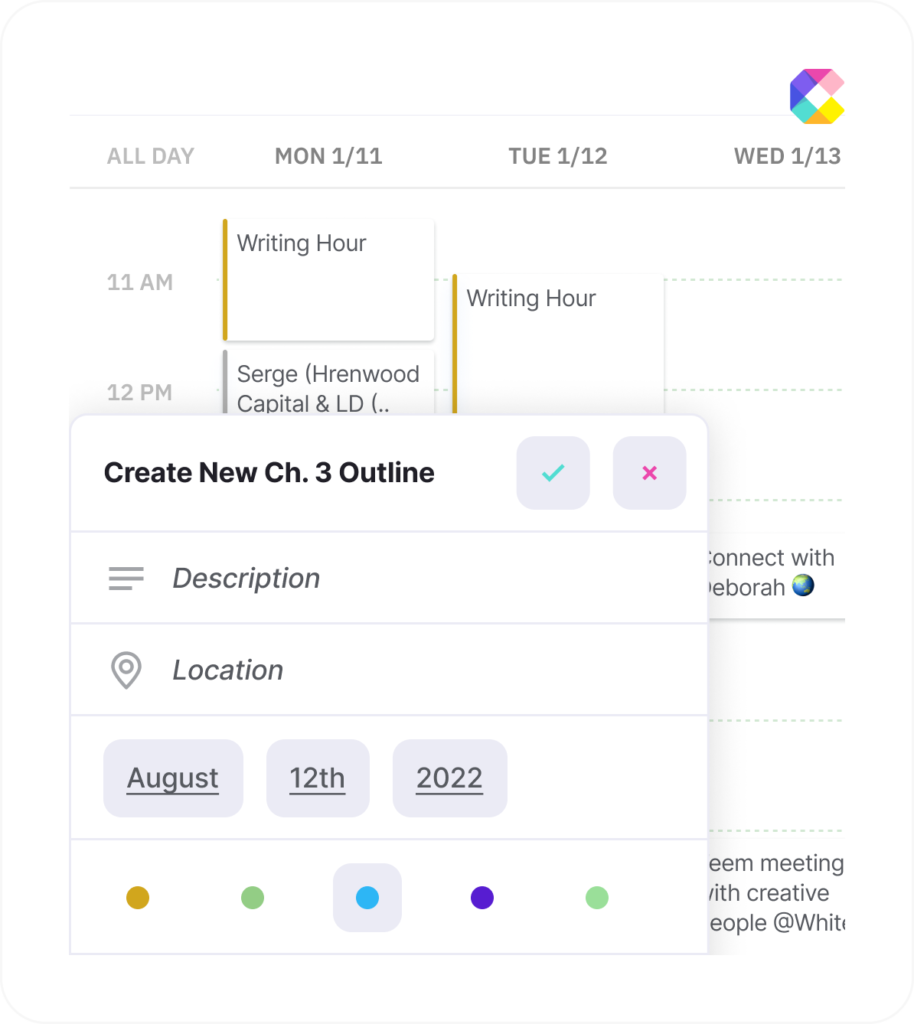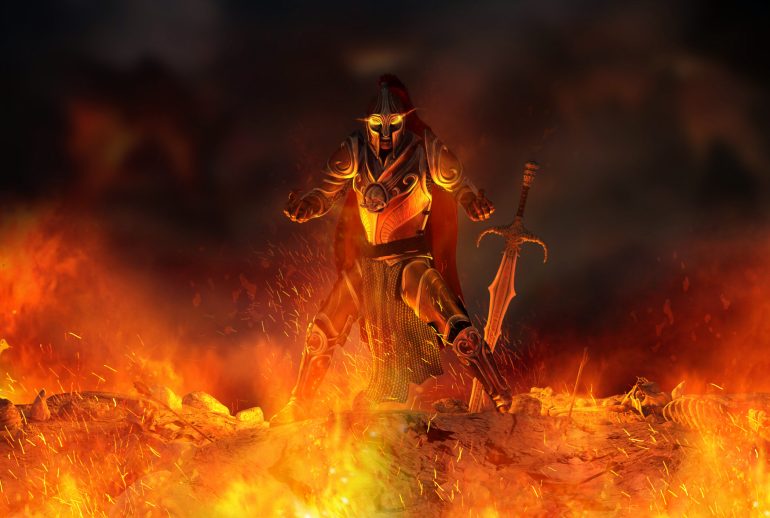If your villain is leeching into everything you do, you’re not alone. Writing means slipping into the headspace of the character… even the bad guy.
Look, sometimes writing the best villain means becoming the bad guy… if only for a little while. It’s no big surprise when we become like the character we’re writing. Getting into the headspace of a character makes them sound more authentic, realistic, and, well, interesting.
But when you’re writing the villain, letting them get into your head while you’re in theirs can cause problems.
This might turn into you having a more jaded outlook on life, taking on specific—and possibly undesirable—bad guy traits, or otherwise becoming your bad guy in either small bits or large, sweeping fashions.
You’ve likely seen this phenomenon in actors playing the role of the bad guy—the Joker famously creates villains of good actors, if only for a while. Because writers have to get into the heads of their characters much the same way actors must, this can cause undue issues, concerns, and troubles along the way.
Here are some tips you can take to try to mitigate your bad guy’s impact on your personal life as well as help you keep your overall mental health in check during the creation and writing of your book’s villain. So keep reading!
The villain phenomenon—does it affect you?
Some writers, when writing their bad guy, slip a little too far into the headspace of the character. Sure, this makes for a realistic, captivating bad guy. If you want a truly authentic, gritty, and entertaining baddie, you have to become the bad guy while writing them.
And that’s a great tactic to use.
But what about when that bad character refuses to vacate your mind when you’re not writing?
This isn’t uncommon, and it’s been popularized by actors playing roles of the villain like the Joker in any Batman movie. Because actors have to get into the mind of the role they’re playing—much like the writer has to slip into the shoes of their characters—this can cause serious issues during downtime when it’s no longer appropriate to be in the bad guy’s headspace.
This might mean being mean or snapping at loved ones, having a more cynical or jaded world view that affects relationships or even takes the fun out of activities you once enjoyed.
So how can you combat this frustrating by-product of being a writer?
When you’re done writing for the day (or even the moment)…
Take a few moments to ground yourself. Run through your beliefs, morals, values, and what’s important to you. Make sure you include the things that directly contrast your character’s viewpoint.
When it comes to actors, they sometimes have to stick in character for the entirety of a movie’s production. Some authors do this too, but sometimes, it’s just not possible to stick in the bad guy’s head long term. So if you can escape, do so.
Take deep breaths. Roll your neck and shoulders. Have a routine that you do every time you quit writing as a way to subconsciously clue your brain that it’s time to let go of the bad guy and get back into your own head again. If you do this routine every time, it’ll become a habit and will very much expedite this process.
Spend a few moments meditating and bring yourself back to a place of warmth, comfort, and reality.
If you don’t meditate, do some mindless task instead, but make sure you’re focused on your life, who you are, and what you believe in. While doing dishes, think about your past, your future, and what drives or motivates you.
Try to make space in your brain for you. This can be easier said than done, but with some practice, you’ll learn to slip between your thoughts, your character’s thoughts, your world, and your book’s world with ease.
And if it’s a challenge, try a different approach.
Remind yourself you’re not the bad guy.
This might seem like a no-brainer, but the power of actively banishing your villain from your mind cannot be understated.
Do something kind for someone. Something so out of character for your bad guy that you’ll put yourself back in your own shoes and banish the bad guy back to wherever he belongs, obscurity, the dark recesses of the forgotten, the graveyard of bad thoughts and memories, however you personally banish bad thoughts.
Besides, the upside to this is that you’re putting good out into the world, you’re making someone else happy, and you’re strengthening your own beliefs, values, and morals. Win/win/win! Those pesky bad guys know just what to say to convince us to go to the dark side (doesn’t the dark side have cookies?) but letting your villain sweet talk you into bad thoughts, ideas, and actions won’t make you happy and it might just ruin your life.
What if I’ve never had this problem?
I know this issue only affects some writers. However, if this doesn’t happen to you, that’s a good thing! But I fully believe any author, any time, can fall prey to negativity, and writing a villain can absolutely magnify that negativity.
Life is tough! It can be easy to slip into a headspace of pessimism. You don’t want that to happen to you. So watch for the signs, be aware of your thoughts and emotions, and remember that you’re creating whole, well-rounded characters that can affect your thoughts and life if they get a chance.
Mental health is a fickle thing, and just like hanging with the wrong people can push you to make decisions you wouldn’t otherwise make, bad characters can bring out the worst in you. Don’t rise to the bait! Keep being awesome and don’t get dragged into living the life of the bad guy.
Besides, a believable villain who’s persuasive and dark is the best kind to read. When we watch movies, we often see parts of ourselves in those characters. We’re strong like them, or smart, or brave, or willing to make hard choices like them. But when it comes to the bad guys, the best ones are ones we also identify with on levels we don’t care to admit. This allure can suck us in and change our lives at any time without warning. So be wary.
Now I’m scared of writing my villain, thanks.
Sorry to be the bearer of bad news, but nothing in life is without risks. This includes writing the bad guy. So make sure you’re making a clear separation of work and real life. It can be easy to get pulled into your fictional world whether you’re reading or writing, so just stay aware and careful.
By keeping a clear separation, you’re conditioning your brain to purge the bad guy when his or her time comes. Beyond affirmations, habits, and being mindful, you can also remind yourself that you have limits (because I bet your villain doesn’t). You can give the bad guy less screen time. (Where possible, of course.) You can write a character that doesn’t align with your own personal bad traits. (Come on, we all have a little bit of evil in us, and by writing a villain that caters to yours, you’re giving that part of yourself airtime and justifying their actions.) And you can remind yourself that the bad guy gets punished in the end (if they do).
Try to find a method that works for you and stick with it. While no one technique works perfectly for everyone every time, just being mindful is a huge step. And obviously, make sure you’re looking after your mental health. If you’re discontented with life, struggling in some manner, or anything else, it becomes much easier to justify your own bad thoughts or to slip into a dark mentality that can turn your whole life into a downward spiral of despair, anger, frustration, or struggle.
You’re a good guy, so don’t let the bad guy fool you
Like mental health, we all (I think, at least, correct me if I’m wrong in the comment section!) have that little voice inside that speaks to us. Sometimes it says good things, but for a lot of people, that little voice is mean, cruel, or even downright evil.
So it’s important to have a support team, help, and regular breaks that remind you you’re not the bad guy in your own story. (Unless you are – if you are, then work on yourself! Or stay evil, I guess, if that makes you happy.)
Again, doing something kind is a great step here. Volunteer in your community, do something nice for a friend or loved one, or even do something nice for you. By improving the lives of others, you’re proving to yourself that you’re kind at heart. You’re not the villain. Unless your villain would do those things, then you might be in trouble. Good luck!
I can’t tell if you’re being serious or not…
Okay, maybe I’m poking a bit of fun. But it is true, some of the writer population struggles with this issue. So it’s important to be kind to your fellow writers, or yourself, if you battle this problem.
Check in with people who care about you, take time for yourself, and do kind things for yourself and others. Nurture your mental health and see someone if you need to. Being a writer isn’t an easy profession for anyone, even if it’s a rewarding career.
We can help one another through this isolating, difficult, and often painful career choice. If you notice a fellow author going through a tough patch, offer a hand, or a listening ear. You might make all the difference in someone’s life. And hopefully, someone will be there when you need them.
Be kind, always, and happy writing.

Goals Calendar
The goals calendar will help keep you on track and ensure deadlines are met. It will keep you accountable to your goals and help ensure timely story completion.



